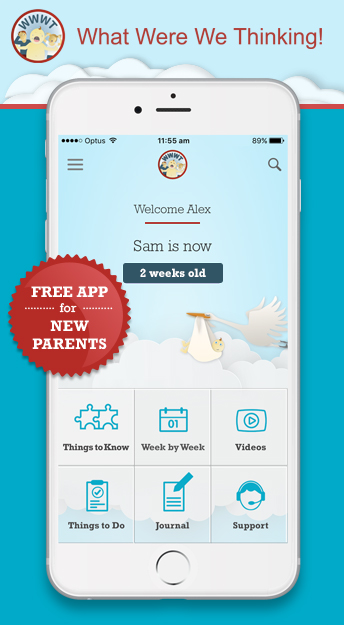How can I soothe my unsettled baby?
By Jane Fisher

One of out parent bloggers, Kylie, recently gave a vivid and eloquent account of the experience of caring for an unsettled baby whose behaviour was becoming increasingly difficult to manage. This situation is quite common: about one in three Australian families experience infant crying that is problematic because it is intense, prolonged and doesn’t respond to soothing, and about one in four families experience problems with infant sleep including waking after short sleeps during the day and waking very frequently overnight.
Often we presume that these behaviours are related to hunger and so offer the breast or bottle, and next, we can think that they are indicating pain and so we seek to soothe by rocking or walking the baby or wearing the baby in a sling. When the baby has been fed and has had a period being awake, these are generally not the explanation.
A lot of the information for parents of new babies focuses on feeding, in particular breastfeeding. The instruction to ‘feed on demand’ is quite non-specific and difficult to interpret. It leads us to presume that every cry indicates hunger and that feeding should be the first response to crying. There is little guidance about when to stop ‘feeding on demand’. In reality parents require more than one strategy to respond to infant crying and have to take the context or situation into account.
Intense and prolonged crying in infancy is not well understood, but is thought to be one end of a spectrum. One of the factors that is thought to be relevant is differences in infant temperament, which is the characteristics that are intrinsic to the baby, a bit like personality. Babies who cry more intensely than others have a low threshold to arousal, which means that they are very alert to stimulation or activities. They react strongly to unfamiliar experiences, including gut sensations and to interactions with caregivers. As they get older this is expressed in wonderful enthusiasm and interest in the world and how things work, but in infancy it can lead to over-stimulation.
Much less information is made available to parents about infant sleep needs and how to respond to these. This can mean that we presume that babies will go to sleep when they are tired, and that they will take all the sleep they need. In practice, especially for easily stimulated babies neither of these is true. These babies need help to learn to sleep. This means that caregivers have to acquire the skills and experience to establish predictable sleep routines so that the baby learns to associate sleep with being tucked up and comfortable in bed and not with being in their parents arms or the car seat or suckling.
Kylie's baby's unsettled behaviours had become severe and it is very good that Kylie sought help. Australia’s residential early parenting services are unique. They provide very structured four- or five-night programs to assist families with babies whose behaviours are very unsettled to learn to establish sustainable routines of daily care. The evidence we have from follow up studies with mothers and babies who have completed these programs is that everything improves: babies cry less, sleep longer and are able to concentrate and enjoy play when they are awake and mothers report improvements in every dimension of mood: less sadness and anxiety, less irritability and improved concentration and day-to-day functioning. Kylie’s account describes this beautifully.
However, these programs are not accessible to everyone: they have long waiting lists and there are few in rural or regional centers. The What Were We Thinking! Program is informed by the evidence from early parenting centers and seeks to prevent these problems becoming established in the first place. The important thing to remember is that these are difficult practices to implement and that none of us can do it solo. Remember the most important skills are to be consistent, to persist and to make sure that all the baby’s caregivers use the same approach. Have a look at the Feed Play Sleep and Understanding Crying sections of the website.
Jane Fisher is Clinical and Health Psychologist and Professor of Women's Health. She has been a sessional consultant to Masada Private Hospital Mother Baby Unit since 1996. Jane's research focuses on understanding and addressing the factors that influence women's and men's health and wellbeing during pregnancy and the life phase of caring for young children.
Posted in: A new reality Baby 5-8 weeks Crying settling sleeping Growth and development Parenting Experts








